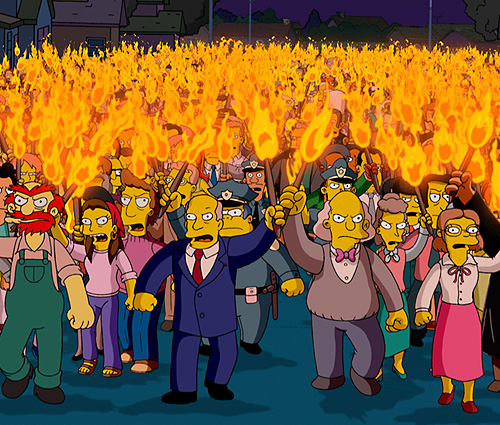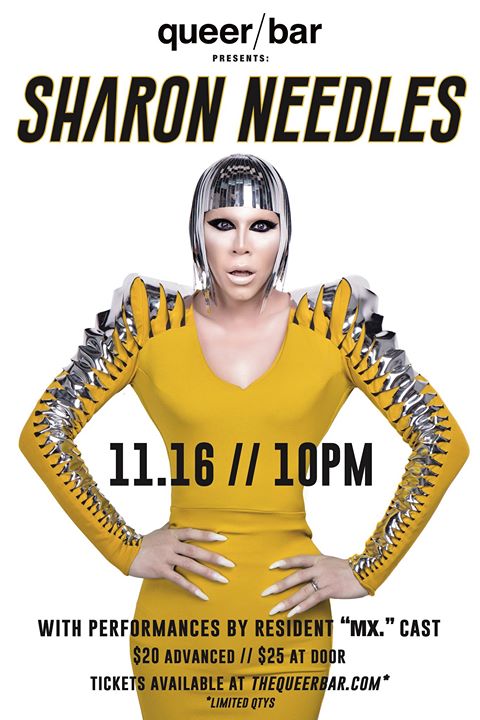Yesterday, we broke a little story about a reportedly homophobic slight experienced by a member of our community by staffers at Seattle’s new “Great Wheel” on Pier 57. It was posted on Facebook, and immediately the comment flurry began, and very quickly enough acrimony was generated to start people gathering pitchforks and torches.
Now, this was rather disconcerting for a number of reasons – not just that there was a possible act of homophobia visited upon a Seattlite, but that we hadn’t yet heard the other side of the story. Later, The Great Wheel (or their publicist) would issue a statement of their own explaining their side of the story, and ended their statement with the following:
Our staff was unaware of their sexual orientation and that played no role in their being asked to leave. We look forward to having everyone ride the wheel, including our friends in Seattle’s GBLT community.
Now, we don’t know the whole story. And neither do you. None of us will every know, because we weren’t there. And regardless of what we hear going forward, it will be irrelevant – because there’s no substitute for being a first-hand witness. As progressive minded folks, we’re immediately inclined to take sides against business and take up arms for the downtrodden. But one thing we can take from the Wheel’s statement is a tacit promise that they do not harbor any homophobic tendencies and that they won’t in the future. This affords us the luxury of scrutiny in the future if similar complaints surface – whether or not they MEAN what their official statement says, we can now refer to it if something happens down the line. But already there’s a layer of damage done that may or may not be fair. Because of one person’s perception of their experience, a business now has to work hard to repair damage that, again, may not have been fairly earned. We’re swift to make fun of The Tea Party and the anti-gay, pro-chicken people that gathered up to support Chik-Fil-A and their anti-Equality sensibilities – but that mob-mentality reflex swings both to the right and to the left.
But that’s not what this little editorial is about. What struck me about this entire episode was an all-too-familiar strain of herd-mentality that we, as people, are prone to – exacerbated, and accelerated by social media websites. In the case of the Great Wheel, it was Facebook. In the case of revolutions in Tunisia and Egypt, it was Twitter. Not exactly equal in their impact and social import, but the speed with which we can disseminate information all too frequently exceeds our ability to apply a layer of logical skepticism and critical analysis to stem the tide of aggressive hatred that too easily can be created. After all, you can’t un-ring the bell.
Yelp.com is an excellent example of unfiltered spewing. In seven short years, Yelp has become synonymous with crowd-sourced reviews. When Yelp (and similar sites) were first born, the concept was rather exciting and revolutionary. It was a way to simplify the “Message Board” concept (which was notoriously nerd-centric) and open up this act of information sharing in an easy to use interface… perhaps too easy to use. If you visit Yelp now, and look up a business, you will likely wade through a good number of “reviews” that are little more than spewed bile with no explanation. (In their defense, Yelp works hard to cull out the useless reviews, but it’s an onerous task, to say the least.) When you see a positive review of a business, bar, restaurant or shop or whatever on Yelp, the writer will invariably elaborate on what was so delicious, why the experience was so brilliant, and many reviewers frequently go into great (sometimes overwrought) detail about their experience. However, if the experience is negative, the review is all too often brief and aggressive, with no notations as to what was so terrible about their experience. Is it because we’re prone to react emotionally to share negative news? Are we motivated to warn our friends and family about the potential dangers of a surly shopkeeper?
Here are a few examples. I’ve copied them verbatim from Yelp, but the names of the businesses have been removed:
- LAME! LAME! LAME! If you like this place, you’re a douchebag.
- Service is crap. Food is worse.
- [REDACTED] is the shittiest bar in Seattle how is it still open?
These are three reviews from three different establishments in Seattle. None of them are helpful. Even though I agree with one of them, I also wonder if these reviewers actually bothered to mention their bad experiences to these businesses. Regardless of what perceptions you might already have about a business, they do want their customers to leave happy. Now, that isn’t to say that the power of the Internet isn’t a miraculous and important part of the lives that we live every day. Not even two decades have passed, and obviously our day to day lives have completely been altered, and the way we share this kind of information is a far cry from the water coolers and coffee klatches where we’d share this information before 1995 or so. But as has been said for ages in comic book philosophy, “With great power comes great responsibility.” We can, as individuals, create change without even thinking about it – one simple status update or an off-handed tweet can cause a ripple effect that we can’t do anything to stop.
For instance, if you go to a restaurant and your food isn’t right, or bad, or you have bad service, you not only have the right to complain directly to the management, and let the restaurant know what didn’t work for you, it’s your responsibility to let them know. Businesses (shops, bars, restaurants, etc.) whether they realize it or not, are the very personality of a community. If a community develops a reputation for having businesses with bad food and shoddy service, it doesn’t take long for the community to disintegrate.
In the case of restaurants, especially in Seattle where we have a ton of options, it’s important for us as consumers to support and promote the businesses that are being exceptional, and try to let those in need of help know why they aren’t living up to our expectations. As Seattlites, are we okay with mediocrity and inadequate service?
It’s a topic of conversation that I’ve had with more people than I can count. Is it better to have a hundred mediocre things than a dozen REALLY INCREDIBLE things? It applies not only to bars, restaurants and shops, but to bands, theatre companies and transportation or any other business that provides goods or services in exchange for money. Why settle for something half-assed? Are we actually so passive-aggressive (as Seattle stereotypes are quick to label us) that we won’t say anything directly to the business, then go to the Internet and put that business on blast? Or are we to blame for a generation of people who as children were raised to believe that everyone who plays wins a medal, and should just be encouraged to continue trying… even if they aren’t doing great? The old rule was that customers speak with their dollars. But now, we have a huge megaphone.
I’m inclined to believe that when a business is no longer doing what it promised to do, or is doing what it always did and aggressively ignores the evolution of the culture or community, then it should be allowed to die. Hopefully it would see the metaphorical writing on the wall, evolve and make changes to ensure it’s own survival. Failing that, they should make room for innovation and let a new bar, restaurant, shop, or whatever step in and answer the public call.
And that public call is never for inadequate service, mediocre product and it’s certainly not for homophobia in a local business. Well, at least not in Seattle.













